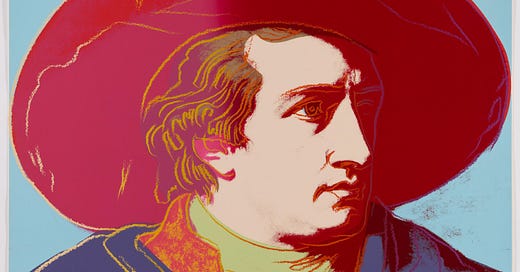🍂 Footnotes #7 | From Spectator to Creator
In this edition: Vladimir Nabokov, Dostoyevsky, Oscar Wilde, J.W von Goethe, Jorge Luis Borges and others.
💭 Word of the week: pronoia - the belief of that everything in the universe is conspiring to support you; the opposite of paranoia.
Hello friends,
I’m writing this seventh edition of Footnotes 🍂 from the plane that is headed to the German city of Frankfurt. I’m excited since it was in Frankfurt where one of my favourite poets was born. The name of this poet is Johann Wolfgang von Goethe.
About five days ago I asked my followers on Instagram to choose my next read and 67 percent of you (if you follow me) voted for a book written by John Armstrong 'Love, Life, Goethe’
The author of ‘Breakfast with Seneca’ David Fideler, who was a guest on my podcast, recommended this book to me saying he cried when he finished it. Now that I’m reading it myself I do understand he got so emotional about it.
It’s exceptionally well-written and throughout it you feel as if you become friends with Goethe himself.
In this edition, I would like to share with you a passage from it. It describes an experience that Goethe had when he was just six years old.
Let’s read that last line once again:
The moral is simple: don't just stare at my life as if it were a puppet show: create your own life, and feel free to take your plots from me.
Goethe reveals to us that there are three ‘types’ of life that we can lead: the life of a spectator, the life of an actor, and the life of a creator.
Some people are born, exist, and then die being spectators. They never venture to think for themselves. Spectators are people who lack critical thinking. We’ve all met a spectator in our life - a type of person who thinks that a film, a book, or a piece of music is great (or bad) simply because everyone else tells them so.
In contrast to a spectator, an actor is an active participant in life. The actor doesn’t simply watch the play. He performs the play. But the problem here is who wrote the play for him?
An actor often is a puppet in the hands of the creator. Like in Disney’s famous cartoon Pinocchio, where Stromboli pulls the strings and dictates what Pinnochio does on the scene, the actor performs the play he’s been told to perform.
Theatre, of course, is not the only place where one can become an actor. People who are driven by their careers often perform the roles written for them by their corporation.
Goethe, however, led the third type of life - that is the life of a creator. They say that a mediocre artist tries to find their audience (their niche), whilst a great artist creates (or invents) his audience.
How do you ‘invent’ an audience?
At the age of six, Goethe discovered he should write the story of his life, not follow what someone wrote for him. One should grow their own personality, since ‘personality is everything in art and poetry’. The same idea was expressed by Oscar Wilde when he wrote that ‘art is the most intense mode of individualism that the world has known.’
Great artist creates not to please their audience, but to discover who they are their individual self. Building an audience is not the aim of their creativity, but a consequence of their unique and individual creativity.
We admire Goethe, Wilde, Proust, Joyce, Nabokov, Borges, and others because they wrote the plot of their life, instead of spectating or acting someone else’s.
Confide tibimet.
🍂 Footnotes
Nabokov doesn’t see Dostoyevsky as ‘a prophet’ and I share his view. Here’s Nabokov’s lecture where he explains why.
Oscar Wilde’s philosophical notebook with my highlights.
One of the best books I’ve read recently on Heisenberg, Borges and Kant and their shared perception of reality. Have a look at this artist in The New York Times.
The importance of handwriting is becoming understood.
I am currently…
📖 Currently reading: Life, Love and Goethe: How to be unhappy in imperfect world by John Armstrong
🎧 Current audiobook: German Genius by Peter Watson
📚 Book(s) Bought this Week: Carlo Rovelli’s Helgoland








From the Nabokov article: “Literature must be taken and broken to bits, pulled apart, squashed -then its lovely reek will be smelt in the hollow of the palm, it will be munched and rolled upon the tongue with relish; then, and only then, its rare flavor will be appreciated at its true worth and the broken and crushed parts will again come together in your mind and disclose the beauty of a unity to which you have contributed something of your own blood.” I may decide to read this passage every morning with my coffee.